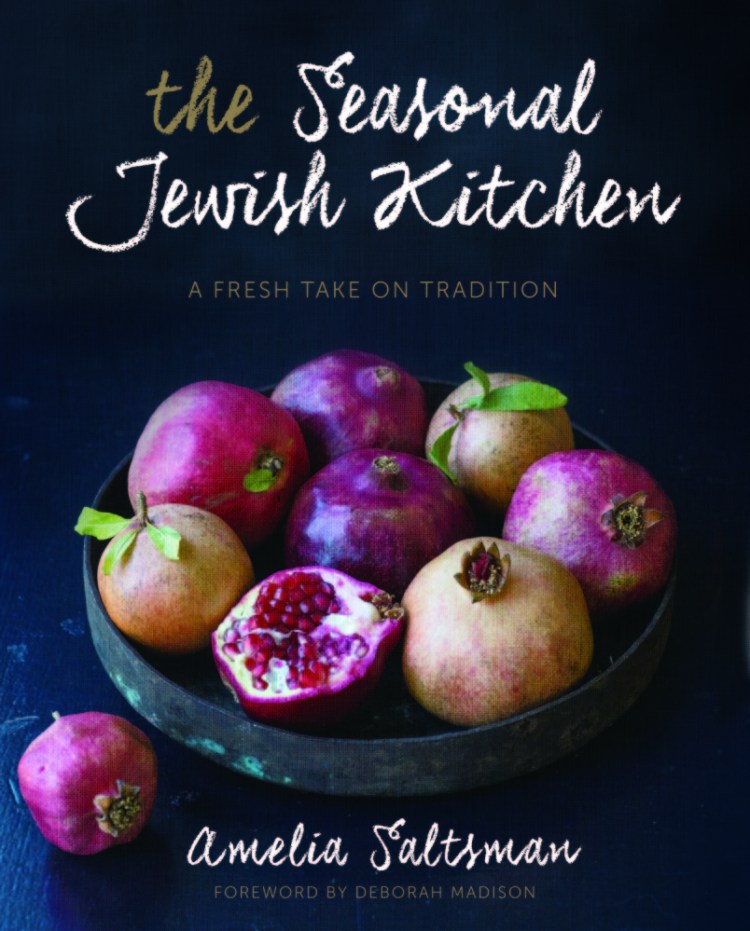“The Seasonal Jewish Kitchen: A Fresh Take on Tradition.” By Amelia Saltsman. Sterling Epicure. $25
For the last several months, I’ve been dipping into “The Seasonal Jewish Kitchen: A Fresh Take on Tradition.” I’ve eaten many delicious things from its exciting recipes – yes, exciting – and sticky-noted at least a dozen more that I can barely wait to cook (work intervenes, damn it). And as I flip pages and slice and dice and whisk and eat, I keep asking myself, “So what is Jewish food anyway?”
Is it matzoh and challah? Brisket? Borscht? Anything cooked by a Jew? When I was growing up in the 1970s in suburban Philadelphia, it certainly wasn’t Tunisian Lemon Rind Salad, the startling recipe that opens this beautiful cookbook. Nor was it Freekeh with Kale, Butternut Squash and Smoked Salt – “Pretty. Nice. A smoky yet virtuous dish,” I scribbled on the page after cooking it. And not Savory Persian Herb and Cheese Hamantaschen, either.
When I finally got around to reading the cookbook, as opposed to gorging on bewitching recipe titles and tempting photographs, I noticed that mine was the exact question author Amelia Saltsman asked herself as she set out to write her book.
Her conclusion in brief: For thousands of years, Jews have lived – and moved – all over the world, adapting local ingredients to fit Jewish tradition and developing a cuisine(s) that uses the food of their homelands and at the same time stands apart from it. Her book weaves together these many varied strands, encompassing the very different Ashkenazi and Sephardic culinary styles, the contemporary melting pot cuisine of Israel and the sensibility of a cook who grew up in Los Angeles, the child of a Romanian mother and Iraqi father.
There are any number of ways to organize a cookbook. Saltsman divides hers by seasons. Interestingly, and I think smartly, she settles on six seasons instead of the usual four, which she meshes both with the Jewish holiday calendar and also “any market-driven cook’s seasonal road map.” September and October, for instance, kick off the book and cover Rosh Hashanah, Yom Kippur, Sukkot and Simchat Torah, or foodwise in part, Roasted Romanian Ratatouille; Syrian Lemon Chicken Fricasee; and Apple, Pear, and Concord Grape Galette in Rye Pastry with Ginger Cream.
Jewish food is having its moment. Call it the Ottolenghi Effect. Everywhere you go, you bump into tahini, halvah, hummus, labneh, Zahav (a hot new-ish restaurant in Philadelphia that everyone is talking about). I haven’t even mentioned the revival of bagels, babka and the deli. “The Seasonal Jewish Kitchen” is a book of its time and for its time. Yet I am certain I’ll be cooking from it for many years to come.
FREEKEH WITH KALE, BUTTERNUT SQUASH AND SMOKED SALT
Freekeh is roasted green wheat. You can find it in specialty stores. I used whole grain freekeh, which required longer than the recipe’s called-for 25 minutes for the cooking liquid to be absorbed.
Serves 6 as a side dish
1 cup freekeh, preferably finely cracked
1 small butternut squash, about 1¼ pounds
1 small bunch tender kale, such as cavolo nero, about 6 ounces
3 tablespoons extra-virgin olive oil
1 teaspoon smoked paprika
Kosher or sea salt
1 small onion, chopped
2½ cups hot water
Smoked salt for finishing
If using whole or cracked freekeh, soak in water to cover for at least 6 hours or up to overnight, then drain well. If using finely cracked freekeh, skip this step.
Halve the squash and remove and discard the seeds and fibers. Using a vegetable peeler, peel the squash halves, then cut into cubes no larger than 1 inch. You should have about 3 cups. Strip the kale stems from the leaves and discard stems, then massage the leaves to tenderize. (If using baby kale, skip this step.)
In a wide pot, heat 1 tablespoon of the oil over medium-high heat.
Add the squash, the smoked paprika, and a little kosher salt and cook, stirring occasionally until the squash is golden in places and crisp-tender, about 10 minutes. Remove from the pot and set aside.
Add 1 tablespoon oil, the onion and a bit of salt to the same pot and sauté until the onion is soft and golden, about 10 minutes. Stir in the kale and cook for 2 minutes. Push the kale and onion to the side of the pot. Add the remaining 1 tablespoon oil and the freekeh and cook for 1 minute, stirring to coat the grains with oil. Stir in the water, squash and about ½ teaspoon kosher salt, cover, reduce the heat to medium-low and cook until almost all the water is absorbed and the freekeh is tender, about 20 minutes. Uncover the pot and cook until all the water is absorbed, about 5 minutes longer.
Transfer to a serving dish and sprinkle with the smoked salt. Serve warm or at room temperature.
Send questions/comments to the editors.




Comments are no longer available on this story